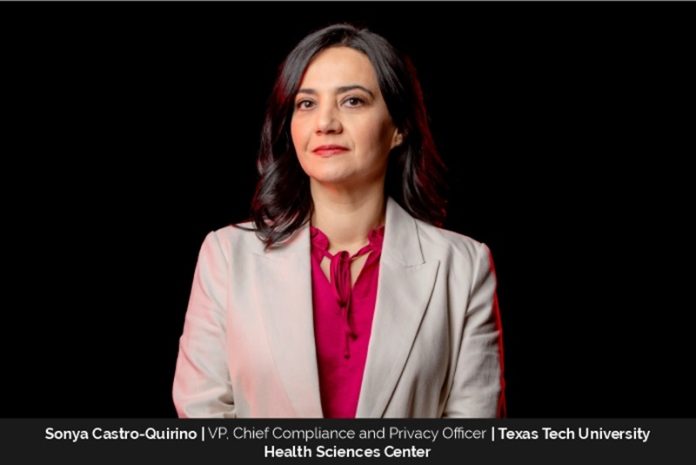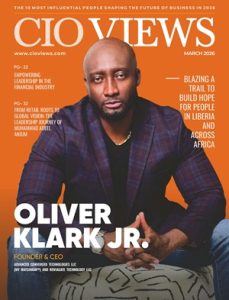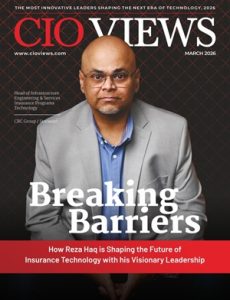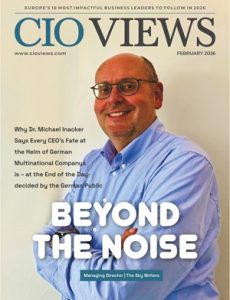About 25 years ago, when the compliance profession was still in its infancy, a young Dr. Sonya Castro-Quirino decided to gain a deeper understanding of it and make a career in the compliance field. Today, she is one of the most influential leaders in the compliance space. As the VP, Chief Compliance and Privacy Officer, she currently oversees compliance throughout the Texas Tech University Health Sciences Center (TTUHSC), a prestigious health-related university headquartered in Lubbock, Texas.
Dr. Castro-Quirino is also a member of several professional compliance organizations, including the Healthcare Compliance Association, American Academy of Medical Centers, Society for Compliance and Ethics, and American Health Information Management Association. She is also certified in various areas of compliance, including healthcare, privacy and security, and research compliance.
Dr. Castro-Quirino aims to be a thought leader who can make meaningful contributions to the field of compliance and beyond. She is tapping into her experience to mentor and develop her team, so they can be the next leaders in the compliance space and beyond.
Stepping into Compliance Landscape
When Dr. Castro-Quirino was pursuing her Master’s degree in Business Administration, she was approached by the CFO of a local hospital during her fellowship. At a conference he attended, a presenter warned that without a compliance program, the hospital could run into significant problems. “This was my initial introduction to the concept of compliance programs,” she recalls.
Over the next year, she dedicated herself to researching and creating a compliance program for the hospital. Her program incorporated the seven elements of an effective compliance program, such as training, education, monitoring, and auditing. And, to learn more, Dr. Castro-Quirino registered for a listserv maintained by the Department of Health and Human Services Office of Inspector General. After that, she applied for a compliance analyst position in Washington, D.C., and was offered the job. “This position set me on the path to becoming a compliance professional,” Dr. Castro-Quirino says.
She then served as a healthcare compliance officer at Wal-Mart Stores, Inc. before returning to her hometown to work for a hospital system. “Eventually, I made the transition to TTUHSC,” she says.
Challenges and Lessons Learned
When Dr. Castro-Quirino moved to Washington, D.C. to work for the Department of Health and Human Services Office of Inspector General, she was required to evaluate and monitor healthcare entities’ compliance programs. “Occasionally, I had to deliver news to a President or CEO that their institution was noncompliant and corrective action was necessary,” Dr. Castro-Quirino recalls. Being new to the field, she found this task both intimidating and challenging.
Dr. Castro-Quirino also drew inspiration from Eleanor Roosevelt’s quote, “No one can make you feel inferior without your consent.” “With that in mind, along with education, preparation, and knowledge, I could deliver difficult news confidently [to Presidents and CEOs],” she says.
Throughout her career in compliance and leadership, Dr. Castro-Quirino has learned the importance of building relationships based on trust, particularly as a chief compliance officer. She points out that compliance work must involve more than just enforcing rules or regulations; it should also be about fostering trust among various stakeholders.
“When the compliance officer and those responsible for upholding the policies, etc., are feared, you may get compliance in the short term, but it is not sustainable and it often breaks down any collaborations that were built,” Dr. Castro-Quirino explains. “More importantly, personally, that is just not how I lead.”
Current Responsibilities and Areas of Focus
Texas Tech University Health Sciences Center is committed to following regulations and institutional policies. So, Dr. Castro-Quirino and her team provide numerous compliance training and education opportunities for the faculty, students, and staff, ensuring that they understand the various regulatory requirements as well as their institutional policies.
The compliance team is also responsible for conducting regular auditing and monitoring activities to assess their adherence to policies and requirements. Dr. Castro-Quirino explains that these activities allow their team members to understand various stakeholders’ expectations, whether from a government oversight agency or their students and patients. “Sometimes, we receive inquiries on issues that don’t fit into a neat little box, allowing us to learn and involve others in the learning process,” she adds.
Healthcare billing and coding, privacy, Clery, conflict of interest and commitment, and immigration compliance are some of the areas that come directly under the compliance office. According to Dr. Castro-Quirinoother compliance requests and initiatives may also be handled by very talented individuals across the institution.
Every day, Dr. Castro-Quirino and her team address compliance matters – from responding to a request for patient records to assisting someone with their immigration status. Also, there are often questions or events that require them to reach out to their colleagues in other departments and outside of the organization. “This is where teamwork becomes exciting and invaluable as we rely on team members to provide information based on their expertise,” Dr. Castro-Quirino says. For example, Human Resources colleagues will inform her and the team of the employee impact a decision may have; General Counsel colleagues will assist them with interpreting rules and regulations; Information Technology colleagues will provide their expertise on security controls, and so on.
At TTUHSC, Dr. Castro-Quirino and others view privacy as a compliance component. The various privacy rules, from the Health Insurance Portability and Accountability Act (HIPAA) to Family Educational Rights and Privacy Act (FERPA), require them to comply with regulations and standards. Dr. Castro-Quirino says that it is their responsibility to deploy training and education programs so that their team members understand those requirements and audit and monitor activities to evaluate compliance and to have a means by which individuals may ask questions or report concerns.
She works with her team to oversee compliance at TTUHSC. They report to her directly or through some other channel of reporting. “We take pride in our institution and encourage individuals to visit our office if they have concerns or questions,” Dr. Castro-Quirino says.
The Amazing Compliance Team
At TTUHSC, the compliance team ensures adherence to their values-based culture from the beginning of the interview process. It is to make sure that each individual understands the institution’s values-based culture and is on board with its high standards of compliance. “If you embrace our culture, maintaining these high standards is easy as it becomes a natural part of who we are,” Dr. Castro-Quirino says.
Dr. Castro-Quirino says that the team’s continual compliance training on various subjects serves as reminders of the team’s commitment to the Institution, faculty, staff, students and institution’s community stakeholders. Additionally, she also tries to make compliance fun and alleviate some of the “fear factor” associated with her office.
Dr. Castro-Quirino engages her team members by having “walkthroughs” where they visit various departments and give real-time feedback. These walkthroughs also allow the team members to ask questions and get to know them better.
At TTUHSC, Dr. Castro-Quirino’s team implemented a Compliance Escape Room, which has become a popular training format. She points out that teams of people discover an “escape route” after they have identified the compliance violations. The Compliance Escape Room exercise began as a way to offer a different training format, and according to Dr. Castro-Quirino, it has quickly evolved into both a competition and team-building exercise. “We award small trophies that our team members proudly display in their offices,” she says.
In her office, Dr. Castro-Quirino has also ensured emphasis on “one team” value. It denotes that they are all in this together. It really takes everyone throughout the organization to make a difference and maintain an effective compliance program.
“Nothing is worth more than laughter. It is strength to laugh and to abandon oneself, to be light.” – Frida Kahlo
Success Means Working as a Team
For Dr. Castro-Quirino, success is working as a team toward a common mission or goal. She points out that many aspects of her team’s jobs require collaboration to obtain the best ideas and to effectively execute their work.
“In the realm of compliance, the guidance we provide affects individuals across the Institution,” Dr. Castro-Quirino says. “Therefore, it is essential to consider varying points of view and understand the impact of our guidance to avoid any missteps.”
About Texas Tech University Health Sciences Center (TTUHSC).
Texas Tech University Health Sciences Center (TTUHSC) has six schools in six locations across the western half of Texas – Abilene, Amarillo, Dallas, Lubbock, Midland, and Odessa. These schools are the Graduate School of Biomedical Sciences, Jerry H. Hodge School of Pharmacy, Julia Jones Matthews School of Population and Public Health, School of Health Professions, School of Medicine, and School of Nursing.
TTUHSC enrolls approximately 5,300 students and serves approximately 2,300 distance education students nationwide and worldwide. And it boasts more than 40,000 alumni, 24% of whom remain in the university’s 120-county service area. Dr. Castro-Quirino also highlights that TTUHSC leads Texas in graduating more healthcare professionals than any other health-related institution in Texas.
“Through its commitment to research, education, and patient care, TTUHSC aims to promote an improved health environment for West Texas and beyond,” she says. It strives to decrease health disparities for rural populations and improve the health of the community through collaborations with area hospitals and health centers.
TTUHSC celebrated its 50th anniversary in 2019 by getting listed for the first time on the ‘Great Colleges to Work For’ list and ranked in the top 10 colleges as ‘Best for Vets’ by Military Times.
Plans for the Future
TTUHSC already has a mature and robust compliance program that follows the guidance of government agencies, including the Department of Health and Human Services Office of Inspector General, Department of Justice, and Centers for Medicaid and Medicare Services. However, Dr. Castro-Quirino knows that with the ever-changing regulatory landscape, there are always opportunities to refine one’s program. She also recognizes that as technology advances, new compliance challenges arise, which necessitate staying up-to-date with technological progress.
Cybersecurity threats are real; therefore, Dr. Castro-Quirino firmly believes in being always prepared for bad actors and respond effectively if something goes wrong.
The rise of artificial intelligence, or AI, is significantly impacting institutions and the healthcare landscape. While AI definitely has its advantages for medical providers, patients, research participants, and students, it also presents various compliance challenges, some of which are yet unknown, according to Dr. Castro-Quirino.
“Having a highly adaptable compliance program and team is a must, particularly with the emergence of new technologies,” she adds.
Maintaining a Healthy Lifestyle Balance
During the pandemic, Dr. Castro-Quirino saw a marked increase in the number of meetings she had daily. “They have not decreased since,” she says. She spends most of her day in meetings related to compliance matters or institutional initiatives. Additionally, her team continues to meet to discuss questions posed to their office or provide guidance on implementing a compliance requirement. “The remainder of my time is focused on training and education, researching best practices, and analyzing compliance requirements,” Dr. Castro-Quirino says.
Does a series of meetings allow her to maintain a work-life balance? Dr. Castro-Quirino, a mother to three daughters, feels that a healthy lifestyle balance can be challenging and takes a lot of work. Fortunately, she has a great family at work. She says that they pull together to fill in the gaps when a team member’s life needs attention outside of the office.
“I am also part of an amazing leadership team that collaborates to accomplish the Institution’s goals, and we are led by a compassionate, empathetic President who understands family commitments and encourages a work-life balance,” she adds.
And, her husband sends her an email every Monday morning, outlining their daughters’ busy schedules and who is going to shuttle them to and from their events — theatre rehearsals, volleyball and track practices, doctor appointments, and school drop-off and pick-up.
Then, there are times when she and her husband need extra help. That is when Dr. Castro-Quirino’s family and friends come in. “We are so fortunate to have parents who are still able to fill in when we can’t (sometimes at a moment’s notice) and friends who are also willing to help when needed. It truly does take a village,” she says.
It is not always a smooth ride for Dr. Castro-Quirino. There are “certainly” times when she feels overwhelmed with work and family, and she begins to feel like she is not doing her best at any of her responsibilities. “Then, I think of the example I’m setting for my daughters,” Dr. Castro-Quirino says.
Her daughters see her get up early to exercise, shuttle them to school, and sometimes even practice a presentation in the car. She reveals that they often work together to make dinner, or if time does not allow or they are all just too exhausted, they eat out at a restaurant or get fast food. “While I would love to cook a healthy meal each day, I have to prioritize spending time with my family is what’s important,” Dr. Castro-Quirino says.
“There’s no way to be a perfect mother and a million ways to be a good one.”
– Jill Churchill
Engagements Outside the Institution
Dr. Castro-Quirino regularly attends and speaks at compliance conferences. She engages with other compliance professionals to develop processes and policies that address regulatory requirements. “I also attend leadership conferences outside of compliance to develop and reinforce my leadership skills continually,” she says.
In order to understand what is expected from their Institution, Dr. Castro-Quirino works with government agency representatives. She says that she has been fortunate to work for a governmental enforcement agency and an institution subject to those requirements.
Sometimes, people may fear asking regulatory agency representatives questions because they fear being targeted. However, in Dr. Castro-Quirino’s experience, if these representatives get to know someone and see that they are trying to develop processes to comply, they are not interested in targeting them. “In fact, they may come to rely on you for your expertise, and it can be a mutually beneficial relationship,” she points out.
Message to Aspiring Leaders
Dr. Castro-Quirino encourages aspiring leaders to pursue a career in compliance. “It can be extremely rewarding,” she says in a message to them. “It’s an ever-changing field, and there’s never a dull moment with continual learning.”
“Also, working in a compliance office allows you to be involved in all aspects of an organization and work with individuals throughout the enterprise,” she adds.





